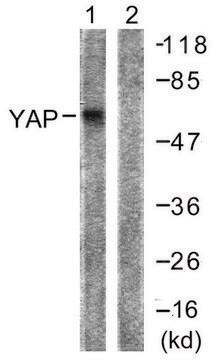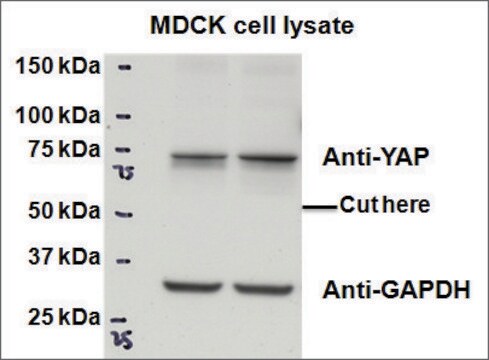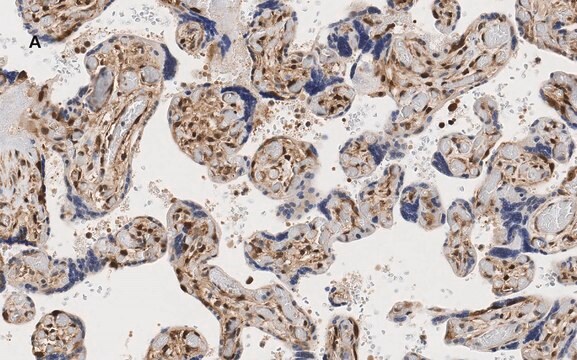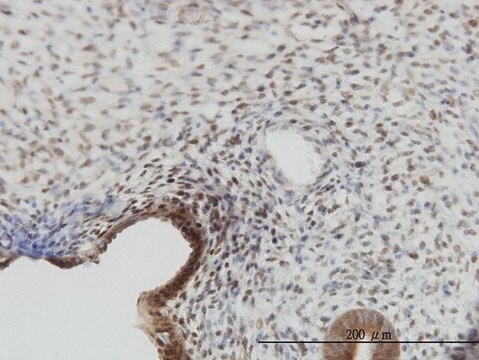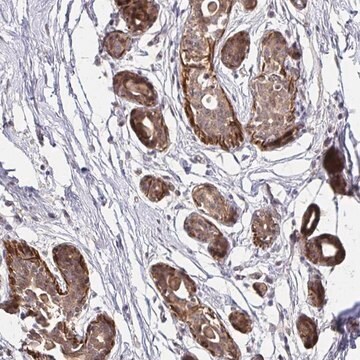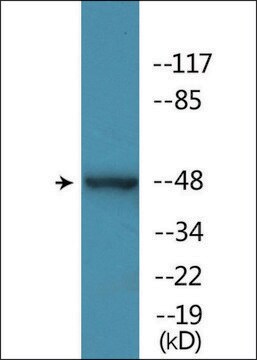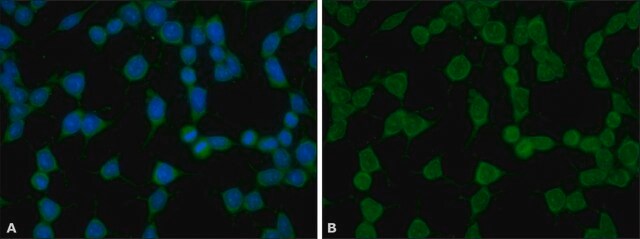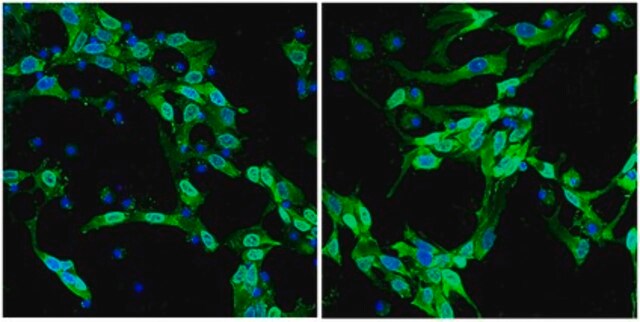推薦產品
生物源
rabbit
品質等級
共軛
unconjugated
抗體表格
affinity isolated antibody
抗體產品種類
primary antibodies
無性繁殖
polyclonal
形狀
buffered aqueous solution
分子量
antigen ~65 kDa
物種活性
human
加強驗證
recombinant expression
Learn more about Antibody Enhanced Validation
濃度
~1 mg/mL
技術
western blot: 0.5-1 μg/mL using HEK-293T cells co-transfected with human YAP1 and c-Abl
UniProt登錄號
運輸包裝
dry ice
儲存溫度
−20°C
目標翻譯後修改
unmodified
基因資訊
human ... YAP1(10413)
mouse ... Yap1(22601)
rat ... Yap1(363014)
一般說明
YAP1 (Yes-associated protein 1, YAP, YAP2, YAP65) is a modular adaptor protein with multiple protein interaction domains, that is based on its interaction with Src-family tyrosine kinase c-Yes. It has a SH3-binding motif, proline-rich amino terminus, a WW domain, a coiled-coil and a PDZ-binding motif at the extreme C-terminus. YAP1 also contains a 14-3-3 interacting motif.
特異性
Anti-YAP1 (C-terminal) antibody is specific for human YAP1. The product is expected to react with mouse, bovine, and dog YAP1. In immunoblotting, detection of the YAP1 band is specifically inhibited with the immunizing peptide.
免疫原
synthetic peptide corresponding to amino acids 442-454 located at the C-terminus of human YAP1. The sequence is identical in mouse, bovine, and dog YAP1.
應用
Anti-YAP1 (C-terminal) antibody is suitable for use in western blot (.5-1 μg/mL) using HEK-293T cells co-transfected with human YAP1 and c-Abl.
Applications in which this antibody has been used successfully, and the associated peer-reviewed papers, are given below.
Immunoprecipitation (1 paper)
Western Blotting (1 paper)
Immunoprecipitation (1 paper)
Western Blotting (1 paper)
生化/生理作用
YAP1 (Yes-associated protein 1) induces p73-dependent apoptosis through the specific and selective co-activation of p53AIP1, an apoptotic p73 target gene. It stabilizes p73 by preventing Itch-mediated ubiquitination of p73. Upon phosphorylation by Akt at Ser127, 14-3-3 is recruited and stimulates YAP1 localization to the cytoplasm, resulting in loss of co-activator function in the nucleus. Inhibition of Akt potentiates the nuclear re-localization of YAP1 to promote apoptosis by p73.
YAP1 is a WW domain containing protein that functions as a transcriptional co-activator . It may also regulate p73 gene function in response to DNA damage. YAP1 is known to associate with a wide range of transcription factors . Alterations in YAP1 have been associated with tumor development .
外觀
Solution in 0.01 M phosphate buffered saline, pH 7.4, and 15 mM sodium azide.
免責聲明
Unless otherwise stated in our catalog or other company documentation accompanying the product(s), our products are intended for research use only and are not to be used for any other purpose, which includes but is not limited to, unauthorized commercial uses, in vitro diagnostic uses, ex vivo or in vivo therapeutic uses or any type of consumption or application to humans or animals.
未找到適合的產品?
試用我們的產品選擇工具.
推薦
相關產品
產品號碼
描述
訂價
儲存類別代碼
10 - Combustible liquids
水污染物質分類(WGK)
WGK 3
閃點(°F)
Not applicable
閃點(°C)
Not applicable
個人防護裝備
Eyeshields, Gloves, multi-purpose combination respirator cartridge (US)
The transcriptional coactivator Yes-associated protein drives p73 gene-target specificity in response to DNA Damage
Strano S, et al.
Molecular Cell, 18(4), 447-459 (2005)
Akt phosphorylates the Yes-associated protein, YAP, to induce interaction with 14-3-3 and attenuation of p73-mediated apoptosis
Basu S, et al.
Molecular Cell, 11(1), 11-23 (2003)
The Yes-associated protein 1 stabilizes p73 by preventing Itch-mediated ubiquitination of p73
Levy D, et al.
Cell Death and Differentiation, 14(4), 743-743 (2007)
Alexander von Gise et al.
Proceedings of the National Academy of Sciences of the United States of America, 109(7), 2394-2399 (2012-02-07)
Heart growth is tightly controlled so that the heart reaches a predetermined size. Fetal heart growth occurs through cardiomyocyte proliferation, whereas postnatal heart growth involves primarily physiological cardiomyocyte hypertrophy. The Hippo kinase cascade is an important regulator of organ growth.
Pingping Zhu et al.
Nature communications, 7, 13608-13608 (2016-12-03)
Liver cancer stem cells (CSCs) may contribute to the high rate of recurrence and heterogeneity of hepatocellular carcinoma (HCC). However, the biology of hepatic CSCs remains largely undefined. Through analysis of transcriptome microarray data, we identify a long noncoding RNA
我們的科學家團隊在所有研究領域都有豐富的經驗,包括生命科學、材料科學、化學合成、色譜、分析等.
聯絡技術服務
